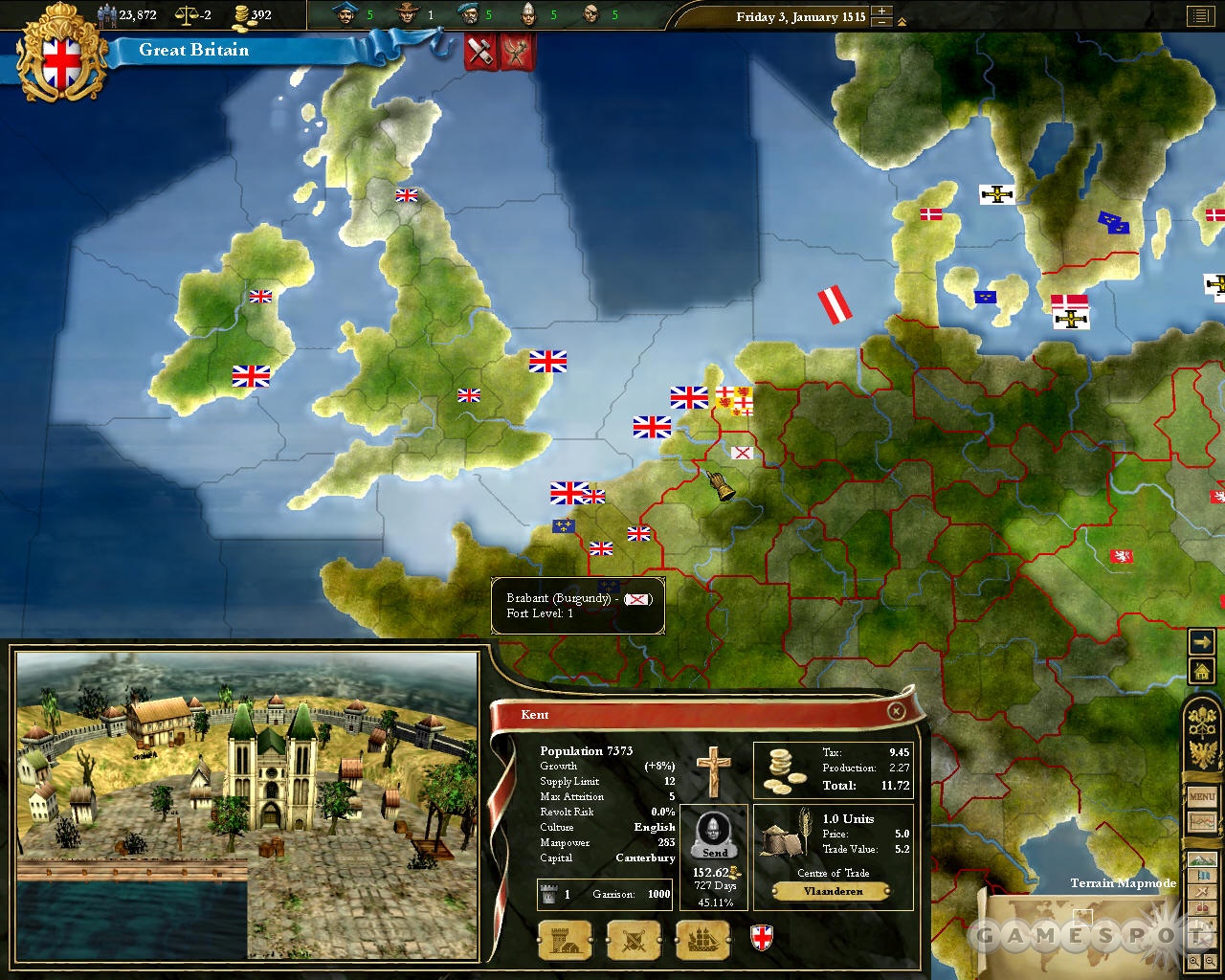Europa Universalis III Single-Player Hands-On
The latest strategy game in this epic Europa Universalis series will let you rewrite the history of the world.
Europa Universalis III is a strategy game about the birth of the modern world, but don't expect to see any of the trappings of today's society. As historians cover it, the modern world began to emerge in the 1600s, as the concept of nation-states settled in. In Europa Universalis III, you'll be able to take control of practically any kingdom or country on the planet that existed between the 15th and 18th centuries and rule pretty much any way you wish. Do you try to take over your continent? Or do you simply try to live in peace while surrounded by belligerent neighbors? The decision will be up to you. We had a chance to check out the game shortly before it ships for some impressions.

This is a huge game in scope, so it may be a bit daunting at first trying to figure out where to even begin. Thankfully, the game does offer a few recommended starting points, so you can jump in during a familiar point in history. For instance, you can play as Spain and dispatch Columbus to the New World and then exploit the discovery. Or there's the Thirty Years' War that raged across the Holy Roman Empire and drew in a large number of European powers. Or there's the American War of Independence, which lets you fight the revolution from different perspectives. If none of these fit the bill, there's nothing to stop you from selecting any country on the map, as well as a start date, and playing from there with your own set of victory conditions to work towards.
Like its predecessors, Europa Universalis III is a continuous-time game, meaning that the game is always moving forward unless you're paused. Thankfully, you can still take your time because at the slowest time setting the days pass by at a glacial pace. This gives you plenty of time to analyze the map, give production orders, and issue movement orders to armies and fleets. Once everything is set, you can speed up the passage of time quite a bit, which is useful in a game where it can take months to build a fleet or years to construct a certain building.
Europa Universalis III boasts a streamlined interface compared to its predecessors, and it is indeed an easier game to play. Almost all the information you need is displayed on the main screen or in a couple of windows, which means that you no longer have to navigate screen after screen to accomplish things. The new 3D graphics engine also helps by offering up a clean presentation. The visuals aren't dazzling in a technical sense, but they do lend a solid board-game look and feel to the game.
We played as England during the Age of Discovery, which meant that we engaged in a race to discover and colonize the New World. Since this scenario began in the earliest era covered in the game, much of the technology tree had yet to be discovered. Therefore, many of the buildings and units remained locked and inaccessible. Thankfully, scientific research for the most part is automatic and a byproduct of your nation's economy, so over time you'll reach new tech levels that unlock a new type of building or new military units. You can further speed up research in different fields by hiring certain types of advisers, such as philosophers. Since you can have only three advisers at a time, though, you'll have to decide which ones to hire. For instance, if you're doing a lot of colonizing, a governor can help improve the odds of colonization. But if you have a lot of trouble with your neighbors, a diplomat can help smooth things over. Which advisers to keep, and which to fire, is up to you.
Finances are fairly simple, because you don't have to worry about adjusting tax rates in all your various provinces. The game simply assumes you'll want to maximize your revenue, so it handles the tax rates for you. That's not to say that you don't have some control over this process. For instance, if you have a rebellious province, the game may prompt you about the situation, and one way to quell the citizens' grievance in that province is to temporarily lower their tax rate. Another way would be to send in the troops, but this would further boost the chances of revolt in that province.

To colonize the New World, we built up fleets of carracks and sent them to the New World, a hazardous journey that resulted in many ships being lost at sea because of storms and navigational hazards. Still, once we had managed to locate North America, we dispatched colonists to settle the land. Colonization is a very risky endeavor, though, and many of our colonies failed early on. However, there are various ways you can boost your chances of success. For instance, you'll be prompted that the Native Americans are suffering from the diseases brought over by the Europeans, and if you choose to send them aid, which will cost you, you'll earn their support. The danger is that it's easy to find yourself spending all of your monetary reserves quickly. If you get into deficit spending, you'll create political instability at home, which can cause all sorts of problems if you were already dealing with rebellious provinces.
You must constantly balance the short term with the long term while playing Europa Universalis III, which is why the series is so popular with serious strategy gamers in the first place. This isn't a flashy or action-packed game, but it is one that lets would-be Machiavellis manage the affairs of a nation. Europa Universalis III is scheduled to ship next week.
Got a news tip or want to contact us directly? Email news@gamespot.com
Join the conversation